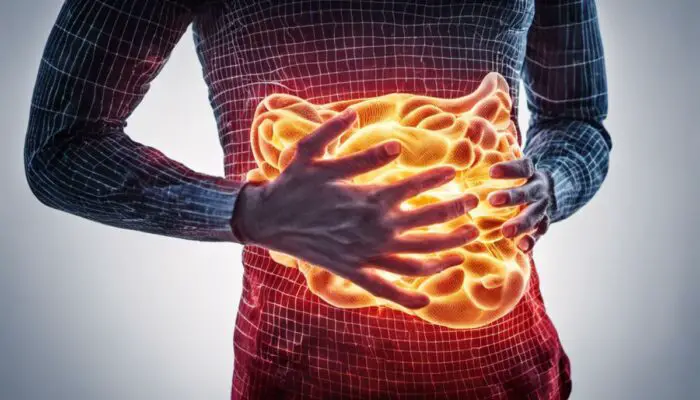Understanding the intricate aspects of our bodily functions helps aid knowledge of diseases that may afflict the human body, their root causes, and effective management strategies. One such condition is Inflammatory Bowel Disease (IBD) – a complex, often strenuous health concern that requires sensitive management.
In this process, the influence of lifestyle choices, particularly alcohol consumption, on IBD cannot be overstated. This piece aims to gain a more profound understanding of IBD, exploring its types, causes, and available treatments.
Moreover, it surveys the multifaceted effects of alcohol, with a specific focus on its impact on the digestive system, thereby delineating the potential connection between alcohol consumption and IBD. The information shared herein is framed by current research and offers valuable insights for those affected by IBD who also consume alcohol, enabling informed decisions about their lifestyle choices.
Drinking Alcohol and IBD: Understanding the Connection
Understanding Inflammatory Bowel Disease (IBD)
Inflammatory bowel disease (IBD) is an umbrella term that describes disorders involving chronic inflammation of the digestive tract. The two primary types of IBD are Crohn’s disease and ulcerative colitis. Both these conditions are marked by an abnormal response by the body’s immune system, causing inflammation of the gastrointestinal (GI) tract.
Crohn’s disease can cause inflammation anywhere along the lining of the digestive tract, from the mouth to the anus. Conversely, Ulcerative colitis characteristically affects only the colon (large intestine). The symptoms of these conditions can vary greatly, but the most common are persistent diarrhoea, abdominal pain and cramping, rectal bleeding, weight loss, and fatigue.
While the exact causes of IBD remain unclear, both genetic and environmental factors appear to be involved. Individuals with a family history of IBD are more likely to develop the condition themselves, suggesting a possible genetic component. Environmental factors, such as smoking and diet, may also play a part in triggering IBD.
Several treatments are available to manage IBD, with the primary aim of reducing the inflammation that triggers symptoms. Treatments often include medication, changes in diet, lifestyle modifications, and, in severe cases, surgery.
Alcohol Consumption and IBD
Research strongly suggests that alcohol intake can profoundly affect Inflammatory Bowel Disease (IBD). Alcohol has the potential to harm the intestine and colon lining, thereby, leading to a heightened intestinal permeability. This can cause bacteria to pass from the intestine into the body, which may amplify existing IBD symptoms.
Moreover, alcohol can disrupt the body’s capacity to absorb nutrients derived from food, potentially instigating malnutrition. This further intensifies the symptoms of IBD. The interference of alcohol with the effectiveness of IBD medications could potentially spur increased disease activity and flare-ups as well.
Although there is much to be considered regarding the physiological effects of alcohol, it’s worth noting that alcohol can bring about bowel stimulation. This can result in more frequent bowel movements or diarrhea, a symptom common among IBD patients. It may prove beneficial to limit or abstain completely from alcohol consumption if these effects become apparent.
On top of the physical impact, alcohol can rend psychological effects which could potentially worsen IBD. A history of alcohol misuse has been linked to an increased risk of depression and anxiety disorders. These conditions are known to be more common in individuals with IBD and can induce IBD flares.
In summary, while moderate alcohol consumption might be safe for some, for those with IBD, even small levels of alcohol can result in deteriorating symptoms. As such, it’s typically advised that patients with IBD exercise caution when it comes to alcohol consumption and should seek advice from their healthcare provider if they harbor concerns.

Alcohol Consumption and Its Implications
Understanding Alcohol Consumption
Alcohol, otherwise known as ethanol, is a psychoactive substance mostly found in beverages such as beer, wine, and spirits. Consumption of alcohol affects numerous bodily functions, most notably the circulatory and nervous systems, as well as the digestive system, which is of primary interest when considering IBD.
Alcohol absorption into the bloodstream mainly occurs through the stomach and small intestine. Once circulating, it has the potential to interfere with critical bodily functions and yield systemic effects which are dependant on both the amount consumed and the individual’s tolerance levels. Prolonged or heavy alcohol consumption can culminate in serious health issues such as liver disease, heart complications, mental health problems, and various types of cancer.
Alcohol and the Digestive System
In particular, alcohol’s impact on the digestive system is noteworthy. It can increase stomach acid production, resulting in heartburn or gastritis. The passage of food along the gut is slowed, potentially leading to constipation or diarrhoea. Moreover, alcohol impairs nutrient absorption by damaging the cells lining the stomach and intestines, potentially leading to malnourishment despite a healthy diet.
Alcohol also disrupts the balance of bacterial flora in the gut, which may contribute to bowel issues. Additionally, it can cause liver diseases such as alcoholic hepatitis, cirrhosis, and liver cancer, primarily due to its metabolic breakdown in the liver, leading to toxic by-products.
Alcohol Consumption and IBD
Inflammatory Bowel Disease (IBD), encompassing Crohn’s disease and ulcerative colitis, is a stressful condition leading to chronic inflammation of the digestive tract. The relationship between alcohol consumption and IBD is complex and nuanced.
Alcohol, due to its pro-inflammatory properties, might exacerbate IBD symptoms. In particular, the intestines’ inflammation can be worsened – aggravating diarrhoea, abdominal pain, and potentially inducing a flare-up. Moreover, as alcohol impairs nutrient absorption, individuals with IBD—who are already at risk of malnutrition—can suffer even more.
Contrarily, research indicates that moderate wine consumption might slightly alleviate IBD symptoms. This effect is attributed to resveratrol, a compound found in grapes known for its anti-inflammatory and immuno-regulatory properties.
Moderate versus Heavy Drinking
While moderate drinking—defined as up to one drink per day for women and up to two drinks per day for men—might have a minimal impact on individuals with IBD, heavy drinking—the consumption of four or more drinks per day—is significantly more detrimental. Heavy drinking exacerbates intestinal inflammation, impairs digestion, compromises immune function, and increases the likelihood of malnutrition, all of which pose significant risks to individuals with IBD.
Although the exact relationship between alcohol and Inflammatory bowel diseases (IBD) is not entirely grasped as of yet, it is widely acknowledged that consuming alcohol excessively can lead to negative implications for individuals living with IBD. Therefore, it is strongly recommended that anyone suffering from this condition have an open conversation regarding alcohol consumption with their healthcare provider to identify a healthy balance that does not negatively impact their health.

Establishing the Connection between Alcohol and IBD
Comprehending IBD and the Role of Alcohol Consumption
Inflammatory bowel diseases (IBD), encompassing conditions such as Crohn’s disease and ulcerative colitis, are lingering and recurring inflammations of the gastrointestinal tract. Despite remaining somewhat a mystery, the root cause of IBD is generally considered to stem from an unusual immune response triggered by factors tied to lifestyle, genetics, and the environment.
One lifestyle element under investigation is the consumption of alcohol. As alcohol has a notorious reputation for causing inflammation in the digestive tract, its relationship with IBD has solicited great interest among medical communities.
Alcohol and Flares in IBD
Alcohol has a complex relationship with IBD. Some studies suggest that moderate alcohol consumption may not necessarily provoke IBD flare-ups. However, in cases where the disease is active, alcohol may potentially exacerbate symptoms due to its inflammatory effect on the intestines.
It could lead to increased diarrhea, abdominal pain, and fatigue. As such, patients experiencing an active flare-up are often advised to avoid alcohol to prevent the worsening of symptoms.
Potential Influence of Alcohol on Disease Onset
The saying “all things in moderation” seems to resonate even when establishing a connection between alcohol and the onset of IBD. Whilst a few investigations hint at a possible relationship between heavy alcohol consumption and a higher risk of IBD, the evidence is inconsistent.
These disparities arise due to variations in study designs, as well as the difficulty in isolating alcohol as a sole contributing factor when other lifestyle aspects could also intervene.
Delving into Research and Studies
Numerous research projects have endeavored to understand the correlation between alcohol and IBD. An analysis of the European Prospective Investigation into Cancer and Nutrition study found that excessive alcohol intake may increase the risk of developing IBD, particularly Crohn’s disease, but not ulcerative colitis.
A Korean national health insurance data-based cohort study also suggested a higher prevalence of Crohn’s disease in individuals with alcohol-use disorder.
In contrast, a Canadian population-based case-control study did not find a significant association between alcohol consumption and the risk of IBD.
The inconsistencies and variations in these findings underline the need for more robust research to conclusively establish this association. While awaiting further answers, it remains sensible to encourage moderation, particularly in patients who have an apparent symptom exacerbation following alcohol intake.
Addressing Alcohol Moderation and IBD Management
Alcohol moderation forms just one aspect of IBD management. If a patient with IBD chooses to consume alcohol, they should do so responsibly, and in moderation. It is vital that they maintain open communication with their healthcare provider, discussing their alcohol consumption and any potential side effects experienced.
Likewise, healthcare providers should be proactive in discussing the role of alcohol in IBD with their patients as part of the broader conversation about lifestyle management.
Ultimately, a combination of dietary measures, stress management, adequate rest, medication, and possibly surgery are the crucial components in successfully managing IBD.
It’s crucial to remember that each individual has a unique set of circumstances. Factors like lifestyle, stage of disease, type of inflammatory bowel disease (IBD), and personal response to alcohol create an intricate web of considerations. This means what may work for one person, may not necessarily work for another. Therefore, it is of utmost importance for individuals diagnosed with IBD to maintain a close, working relationship with healthcare providers to find the disease management strategy that suits them best.

Advice for IBD Patients Regarding Alcohol
An Exploration of IBD and the Effects of Alcohol Consumption
Inflammatory bowel disease (IBD) is a collective term used to describe conditions associated with chronic inflammation within the digestive tract. Prime examples include Crohn’s disease and ulcerative colitis. These conditions bear a burden of hefty symptoms such as severe abdominal pain, relentless diarrhoea, chronic fatigue, weight loss, and malnutrition. Recent studies have shed light on the potential exacerbation of these symptoms in individuals with IBD who consume alcohol.
Alcohol acts as an irritant to the digestive system, potentially causing inflammation and harm to the intestine lining. Moreover, it could disrupt the delicate balance of gut bacteria, sparking inflammation and aggravating the disease. The implications of alcohol do not stop here. Negative interaction with IBD medications and impairment of nutrient absorption in the small intestine are other concerns connected with alcohol consumption.
Safe Alcohol Consumption Practices
If you have IBD and still desire to consume alcohol, it’s essential to do so in moderation. What ‘moderation’ means can vary from individual to individual, but a general guide is no more than 14 units per week for men and women, with at least two alcohol-free days per week. A unit of alcohol is approximately equal to half a pint of beer, a small glass of wine or a single measure of spirits.
However, remember that even moderate drinking can cause discomfort and potentially create health risks for people with IBD. To determine your body’s tolerance level, it’s better to start with a lower amount of alcohol and observe any effects on your symptoms.
Alternative Options
If you don’t feel well when drinking alcohol or want to avoid it altogether, there are multiple non-alcoholic options available. From non-alcoholic beers and wines to mocktails, these options can give you a similar experience without the associated health risks.
Non-alcoholic beverages can be beneficial for people with IBD, as they’re unlikely to irritate the digestive tract or interfere with medication. They can also be perfect options during social events where alcohol is involved, as it provides a viable alternative that enables individuals to engage without feeling left out.
Handling Social Situations
Social situations often involve alcohol, which may be challenging for those with IBD. However, there are some strategies that can be useful for managing such situations. First, consider discussing your condition with friends and family so they understand your limitations about consuming alcohol.
Secondly, don’t feel obliged to drink alcohol just because everyone else is. Many social gatherings are about interesting conversations and making connections, not what’s in your glass. To fit in without drinking alcohol, consider holding a non-alcoholic drink or a glass of water.
Furthermore, if you decide to drink, remember to moderate your intake and be mindful of how your body reacts. If you notice any discomfort or an increase in IBD symptoms, stop drinking immediately.
Professional Health and Medical Advice
To understand better how alcohol can affect your IBD, it’s wise to have a candid conversation with your healthcare provider. They can offer personalized advice and perhaps incorporate alcohol intake into your care plan or suggest safe drinking limits. It may also be beneficial for pharmacists or healthcare experts to review your medications to determine any potential adverse interactions with alcohol.
In Conclusion
After an exhaustive discussion on the links between alcohol consumption and IBD, it is plain to see that the complexities of inflammatory bowel diseases demand careful, informed lifestyle decisions. This body of knowledge helps illustrate the reality for patients living with IBD, calling attention not merely to the disease itself, but to the broader lifestyle implications and necessary adjustments.
In light of these findings, those afflicted with IBD should seek out conversations with healthcare professionals to decide on responsible alcohol consumption practices. Health isn’t solely about managing conditions when they emerge but about making informed decisions to establish a pattern of life conducive to overall wellness.
Enabling this, it becomes vital to take on board the information available at our fingertips, transforming it into tangible action that benefits our health.

Anxiety and Depression best ways to lower blood sugar BiOptimizers blood pressure supplements blood sugar support supplements Digestive Enzymes Supplement digital products Dr Sam Robbins Exercise Gut Health Healthy Living heart health HFL how to lower blood sugar levels How To Lower Cholesterol insulin resistance joint health supplement Keto keto dieting Keto Diet Weight Loss leaky gut supplements leptin resistance list Magnesium deficiency Matt Gallant mental health multivitamins Nootropics nutrient supplements Probiotics Probiotic Supplements Prostate Health proteolytic enzymes reverse type 2 diabetes stress and anxiety stress relief Tinnitus vitabalance vitapost Wade Lightheart weight loss articles weight loss diet plans weight loss product reviews weight loss supplements weight loss tea

